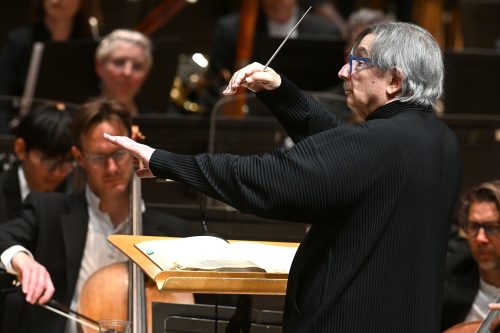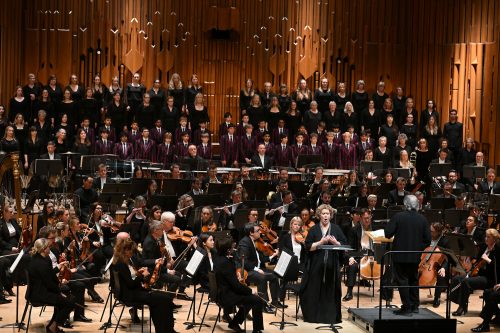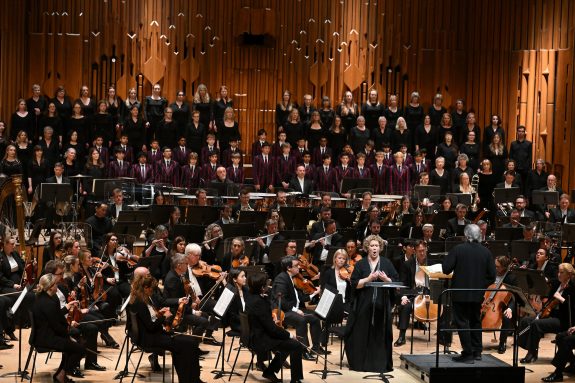 United Kingdom Mahler: Alice Coote (mezzo-soprano), Sopranos and Altos of the London Symphony Chorus (chorus director: Mariana Rosas), Tiffin Boys’ Choir (director: James Day), London Symphony Orchestra / Michael Tilson Thomas (conductor). Barbican Hall, London 12.5.2024. (JR)
United Kingdom Mahler: Alice Coote (mezzo-soprano), Sopranos and Altos of the London Symphony Chorus (chorus director: Mariana Rosas), Tiffin Boys’ Choir (director: James Day), London Symphony Orchestra / Michael Tilson Thomas (conductor). Barbican Hall, London 12.5.2024. (JR)

Mahler – Symphony No. 3
I suspect a good number in the Barbican Hall audience would have been cognisant of the fact that Michael Tilson Thomas, Conductor Laureate of the London Symphony Orchestra, was diagnosed, just a few years ago, with an aggressive form of brain cancer. He gave his last scheduled performance with his San Francisco Symphony Orchestra in January this year, with Mahler’s Fifth Symphony. Apparently, many audience members were in tears. A critic found the performance very measured and quite slow. The same could be said of his view of the Third Symphony with the LSO.
As Tilson Thomas gingerly mounted the steps on his way to the concert platform, with his husband watching behind him, many of the audience gasped at the visible toll which this horrid illness has taken. But once onto the podium, Tilson Thomas seemed to manage to forget his woes and maintained a very measured beat, signalling a few entries and giving some directions. That, however, was the full extent of his input, a distant cry from his earlier years where he would have been athletically bouncing around and being criticised by some for his micro-management. This time, we were pleased he could stand throughout and seemingly not lose concentration. The orchestra was given considerable free rein which led to occasional timing problems.
Mahler’s very lengthy score, especially the first movement, needs more articulation than it received in this performance and failed to hold our attention throughout; no easy task even for the healthiest of conductors but Tilson Thomas is a seasoned Mahlerian and more or less held it all together.
The orchestra played magnificently for him. I highlight the solo trombone, Isobel Daws, currently a member of the Luxembourg Philharmonic, who was simply splendid. Matthew Williams was almost flawless with his offstage flugelhorn. The quieter passages had plenty of charm and grace, I could have done with more bite and savagery in the menacing sections, more banality in the interjections. The slow speeds did however add to the music’s grandeur.

Alice Coote was radiant in her rendition of ‘O Mensch, gib Acht!’, sung very quietly and most movingly. She was ably accompanied by the Leader Benjamin Gilmore and Olivier Stankiewicz’s oboe. The ladies of the London Symphony Chorus were sprightly, intonation perfect, German diction not quite clear and crisp enough (disclosure: I have German blood). The repeated ‘Bimm Bamm’ of the Tiffin Boys was almost inaudible due to the clang of the real bell, though they came into their own with ‘Liebe nur Gott’ (second disclosure: I sang this with the Highgate School Boys’ Choir in the 1960s).
Tilson Thomas chatted with the orchestra in between movements, which was disconcerting, the content inaudible to me. It was odd but at that stage there was no cause for concern.
But it all fell apart at the end of the penultimate movement, the fifth. Tilson Thomas seemed to think the symphony had finished, he closed his own huge red battered score and held it aloft and turned to the audience. The orchestra looked anxious. Alice Coote gently reminded him that there was one last movement left, as a seasoned violinist rushed off to fetch the conductor’s husband, who must have been watching in the wings, and who came on to urge Tilson Thomas to drink some water. Tilson Thomas regained his senses and carried on as though nothing had happened.
At the end, the standing ovation was more a recognition of Tilson Thomas’s past services than an accolade to the evening’s concert; Tilson Thomas, after a lengthy embrace from Alice Coote, hardly moved and just managed a smile of gratitude.
Tilson Thomas is scheduled to repeat this concert on May 16th, hopefully he can regain his strength to appear. The concert was attended by Sir Antonio Pappano who must have thought that he might have to jump in at any stage to complete the symphony. The orchestra has Tilson Thomas down to conduct Mahler’s huge Second Symphony, the Resurrection, in October but the orchestra’s management must be reconsidering the prudence and feasibility of this further appearance.
It was all very sad to witness and took the edge off a fine performance. We were witnessing the end of a great conducting career.
John Rhodes

I’ve heard more polished performances of this symphony but few have moved me as much as this one. We could all see that MTT was unwell, but to me his health issues only added to the poignancy of the occasion. I’ve never seen such a display of love for a conductor from an orchestra and an audience. I find enormously inspiring that Mr Tilson Thomas has decided to spend the little time he has got left making music with his friends and giving us concertgoers a chance of showing our appreciation for him.
Completely agree. The most moving sixth movement I’ve ever heard.
It is incredible that MTT was physically able to travel, rehearse and conduct, having the courage to do so. Glioblastoma is one of the worst cancers to have, impossible to defeat and difficult to keep at bay. I had a close friend diagnosed with it shortly before MTT in 2021; everything was thrown at it after surgery, immunotherapy vaccines flown from to the U.S. from Germany, every kind of chemo and radiation. I am sure MTT goes through the same, all very debilitating. My friend also courageously travelled up until 3 months before his passing in August 2022. I watch MTT with admiration, amazement and love, remembering bringing him to Spain for a tour with the Boston Symphony in 1971!
Hi John & Charlie-
I come in somewhere between the two of you! I don’t think concerts should be indulgences, enabling poorly performers to have one last go (however deserving and poignant the circumstances). Didn’t realise that Pappano was in the audience. Played (well) by him this would have been a much greater tribute to MTT. I also wonder what MTT would have made of this performance when he was at his prime. I think allowing him to conduct this marathon of a symphony was ill advised. He is too unwell to do it justice, and I think he was simply exhausted when he attempted to walk away. I hope the powers that be find a replacement for him this week, and let us remember MTT as he was. He’s always championed rising talent, so this would be a golden opportunity to give a youthful, MTT-esque youngster a chance to make his/her mark.
At the risk of sounding too philosophical, in the end what matters is why we attend live concerts. Is it to listen to music? Or to be moved? Is it because we want to be part of something or because we want to be entertained? If you only care about the music I can see how this concert could have been a disappointment, but my own priorities are very different.
How sensitively John Rhodes walks the line between respect for a once-great conductor, an honest appraisal of the performance and a truthful account of an occasion which nobody there will find it easy to forget. The standing ovation was a surge of sympathy and affection and, as John says, a recognition of his long-standing relationship with the LSO, and particularly his years as Principal Conductor following Claudio Abbado. I remember a stirring performance of this very symphony in this hall 30 years ago; and he conducted the first Mahler 5 I ever heard over half a century ago with the Philharmonia, when he was in his twenties (as was I). There was a lady behind me in tears: I am sure she was not alone.
Perhaps the fantastic work of the first trombone should be acknowledged in the using of the correct name! Isobel Daws to be exact.
From S&H: Apologies to Isobel Daws for the inadvertent error (now corrected), thank you Liz Gandee for this correction too but can those commenting/correcting please try not to hide behind ‘Anonymous’ (as here) or like some others use a fake email address. Jim for S&H
MTT was very much recovered for the Thursday performance and no concessions needed to be made for his medical condition. He was completely on top of everything and the orchestra felt totally secure. You might disagree with the interpetation – I didn’t – but not with the execution and it was a privilege to have been there. Sunday was clearly a glitch, confirmed to me by my neighbour who heard both.
I had no idea what it happened to MTT. It was with great sadness that I read this review. I have not seen him in many years, and I was shocked because before he was so vibrant with his lectures and conducting. My thoughts are with you, Maestro. Best wishes as you travel this road in front of you.
I was at the Thursday performance, and had no idea about Sunday’s events, or indeed his illness, taking his frailness to be simply old age. His demeanor reminded me very much of André Previn’s final appearances – the body was weak, but the musical spirit fully intact. Yes, the first movement was a bit lacking in momentum, but it meant the LSO could reveal details and harmonies not normally noticed. And the performance certainly reminded me of why I think the final movement of the 3rd (along with, arguably, the last movement of the 10th) is the most moving thing Mahler ever wrote.
Even if MTT doesn’t return for the 2nd (I have my ticket!), he has certainly left us with wonderful memories.
I was at The Barbican for the repeat on May 16th, and MTT was bloody magnificent. Thank God, Pappano didn’t need to stand in. I saw his Mahler 1 at the BBC Proms some years ago and it was a mess.
I found this article somewhat patronising.
S&H replies: as you write you were not there at the performance reviewed though you call it ‘patronising’ whilst you can call another performance a(n unqualified) ‘mess’. Interesting. Jim